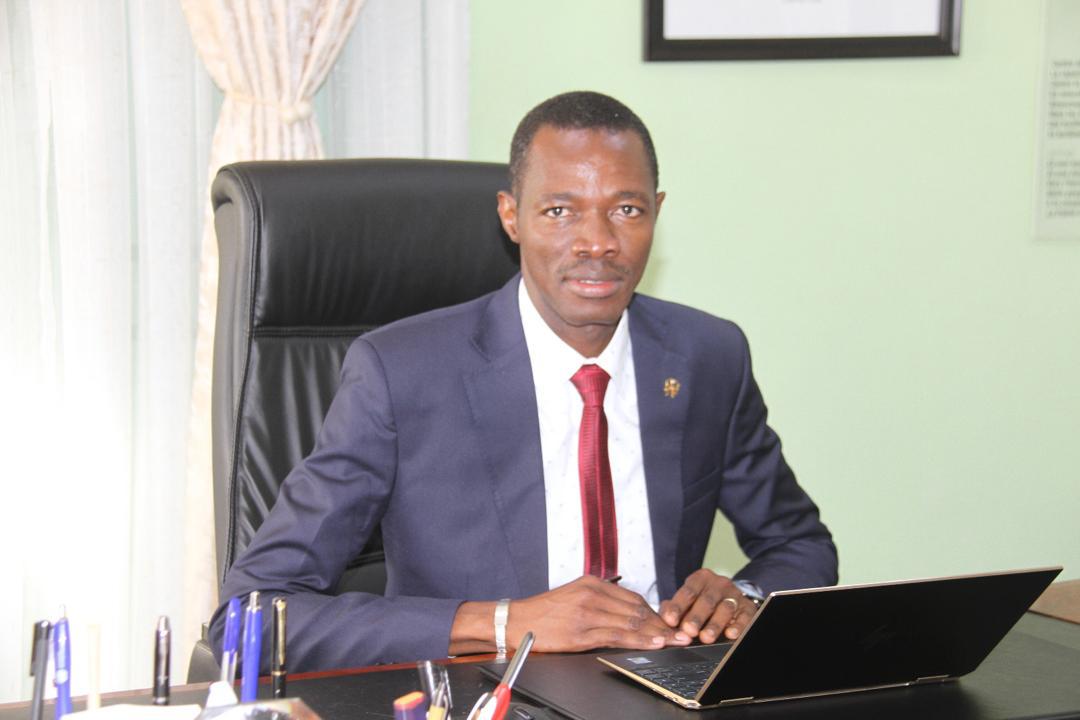Roger Baro has served as Burkina Faso’s Minister of the Environment, Water, and Sanitation since June 2023. He previously led environmental education, pollution prevention, and environmental preservation efforts in the government. From 2019 to 2023, Baro was a Bureau Member for Africa at the 4th and 5th Conferences of the Parties to the Minamata Convention on Mercury.
What natural resources are most important to Burkina Faso’s economy? How has this distribution changed due to climate change?
First of all, allow me to pay tribute to our defense and security forces, [including] our volunteer[s] of the defense, who do their utmost to ensure security for [our] people. Returning to your question, natural resources [in our country] include land, water, energy, precious gold, zinc, and forests. We have possibilities with solar [energy], [evidenced by] a lot of central photovoltaics [installations] in our country. But this natural resource is faced with climate change [challenges], so we work now to invest [in] the increase of regulation. And for this, we have a main document [in which] we summarize our country’s goal of economic change, [proposed] by the National Committee on Climate Change. We also plan to [implement measures in] our 2015 productivity document to [lower] emissions of carbon [and] reduce our pollution [in the] face [of] climate change.
What are the primary drivers behind the illicit trade in natural resources within Burkina Faso?
You can [attribute] economic factors [to] illicit trade, [with] demographics [playing] a big role [in] this context. [Additionally,] investments, technology, natural resources, transport costs, [and] institutional frameworks [contribute to this issue]. [Regarding] natural resources, mining products are sold [disregarding] the country’s regulations, [leading to] illicit trade. We have a lot of [mining] companies, [and they] need to respect our national regulations. [When this is not] well done, [there is a] possibility [of] illicit trade. When transport costs are very high, this can [incentivize] traders to engage in illicit trade. Also, [lack of environmental controls at] ports contributes to illicit trade because Burkina Faso is not a country with a sea. Certainly, it is a continental country. So, with our border [being] porous, we don't have [total] control [of] our border.
Statistics [show] that some chemicals [enter] Burkina Faso by [the] porous border and return [to] maritime countries. [There is a need to cooperate on] waste management regulations with our neighbors. If that is not [accomplished], we have [the] possibility [for] illicit trade. Illegal wildlife trafficking is a matter of utmost importance, [with] one million animals and plant species threatened with extinction. We have discovered a large network on this topic [and have taken] all the [measures] to fight it correctly.
Social and political [instability] can influence illegal trade. If you have [a] political crisis with periods of absence of authorities, sometimes [the] possibility [of] illegal trade [is increased]. Poverty can [lead] you [to] avoid paying taxes. Security crises [are] favorable to illegal trade [in] environmental [resources like] plants.
How do local communities and indigenous groups in Burkina Faso perceive and experience the effects of the illegal resource trade?
We have a lot of local communities and indigenous groups. First, [the] impact on local livelihoods [is significant]. The actions of multinational [corporations] affect local life [in several ways]. [They] monopolize the goods and services of local communities, exacerbating poverty [and] creating [a] climate of mysteries. [When] some projects [are] implemented in an area, they destroy the [local] markets, [leading to potential] revolts [and] environmental degradation. International industrial mining [activities can] destroy the environment. [Conducting] environmental assessments and proposing new plans to rehabilitate the spoiled environment [are therefore] very important. If [they are] not [done] at [the] community level, we [risk] deforestation, modification of [the] seasonal cycle, food insecurity, and soil poverty.
[There are] also cultural and social ramifications of illicit trade. We have seen an increase in international demand [for] cultural goods caused [by] porous borders [and aided by] rapid development of low-cost means of transport and international art markets. [Additionally,] terrorism [poses a] security [problem]. [Terrorist] groups take opportunities [presented by] population [movements] to take cultural [artifacts] to [engage in] illegal trafficking. [Specifically,] terrorists generate revenue by directly or indirectly looting and smuggling cultural heritage objects [from] archaeological museums. These objects are then used to finance recruitment efforts [and] improve operational [capabilities for] organizing and carrying out attacks.
How do nations and international corporations affect the country's environmental health?
First, we need to work at the national level, [establishing] good regulation [and] implementing [it]. Secondly, you need regional regulation, [especially for countries like ours, since] we are a continental country. We need to have national regulation and regional regulation fight together. [Furthermore, we need] international regulations to have a common view of how to address this kind of situation.
[At] our national level, we have regulations, [including] environmental laws [and] national penal codes. [They outline] what is forbidden, what is allowed, and we have institutional bodies to face this illegal trade. We also [collaborate with civil] society organizations [through our] national organization against corruption, called Réseau National de Lutte Anti-Corruption (RENLAC). [Moreover,] at the governmental level, what we call National Coordination Against Fraud [does a] good [job] on the ground.
[Over] the last three months, [authorities] have discovered illegal traffic with some foods [such as] rice, [which] comes from another country, so the price is high. [Similarly,] illegal trade with clothing [has been detected]. [Additionally,] technical inspection [bodies] work day by day to discover corruption at the national level and propose new [procedures].
What are the main challenges the government and regulatory bodies face in combating illicit trade in natural resources, and what strategies are being employed to address these challenges?
We have the challenge of application. We have a regulatory framework [and] institutional bodies, but we need to [apply them]. [Managing] natural resources pose[s] key challenges to countries: the tax regime [for] the exploitation of natural resources, how best to negotiate with international companies, [and ensuring] public policies [with maximum] benefits.
[Moreover,] we have [a] regulatory gap. The legal framework for natural resource management is often well-developed, both nationally and internationally. However, there are questions about compliance. The main shortcoming [is] monitoring compliance with this regulation due to insufficient financial resources. [Additionally,] we don't have a strong network to identify and [combat] illegal trade in natural resources. Corruption is not out of the question for local players. [They may] collude with multinational [companies to shape] legal texts in favor of [these] multinational [companies]. Corruption affects governance. Corruption, which is equated to developing countries, hampers the state's ability to act through a number of mechanisms. [It] reduces the effectiveness of spending, distorts budget [allocations]. For example, for a given budget item, public spending is less efficient in countries with high levels of corruption. Corrupt officials will favor the investment project that generates the most breaks and [is] not necessarily the most efficient [in] production. [Therefore,] we need to be very careful [and] take all the precautions to not be influenced.
Can you discuss any continental or inter-continental collaborations aimed at curbing illicit trade in natural resources in Burkina Faso?
First, in Africa, we have [the] African Union, [of which] we are part. This initiative needs more affirmation, commitment, and organization to [foster] a more united Africa, [particularly] relating to armed conflict. Financing mechanisms must be discussed, [considering] a lot of crisis situations [are] reinforced by illicit trade. So, at the continental level, we need to reinforce [these] mechanisms.
Also, we have collaboration with international organizations, [but it must occur] within a framework respecting the rights of each party. If you want to have collaboration, first we need to have regulations. We can convene the different regulations to have strong regional, sub-regional, and continental [regulations].
At the intercontinental level, we [are] party to a number of multilateral agreements, particularly in the environment field. [These include] conventions [like] the Rotterdam Convention, the Stockholm Convention, and the Minamata Convention on Mercury. [Additionally, in addressing] climate change, [there are] conventions on desertification and biodiversity. We are part of [these] international agreement[s], and we try to implement [them]. For example, for [the] Minamata Convention, we have worked to track the illegal trade of mercury in West Africa. We [have] noticed that a lot of mercury enters Burkina Faso and is exported to the borders of our neighbors. We are a continental country; this mercury cannot come directly [into] our country. [It must] cross maritime [countries] and return to maritime [countries]. [Therefore,] we need to establish a good network to control this kind of traffic.
Dake spoke with Baro on March 12, 2024. This interview has been lightly edited for length and clarity.





